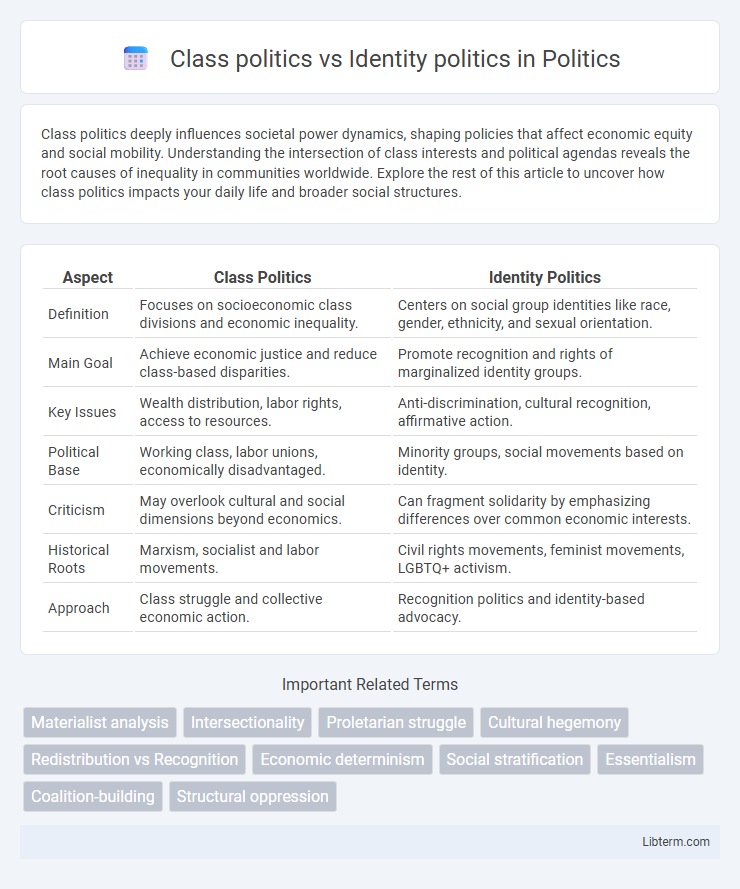Class politics deeply influences societal power dynamics, shaping policies that affect economic equity and social mobility. Understanding the intersection of class interests and political agendas reveals the root causes of inequality in communities worldwide. Explore the rest of this article to uncover how class politics impacts your daily life and broader social structures.
Table of Comparison
| Aspect | Class Politics | Identity Politics |
|---|---|---|
| Definition | Focuses on socioeconomic class divisions and economic inequality. | Centers on social group identities like race, gender, ethnicity, and sexual orientation. |
| Main Goal | Achieve economic justice and reduce class-based disparities. | Promote recognition and rights of marginalized identity groups. |
| Key Issues | Wealth distribution, labor rights, access to resources. | Anti-discrimination, cultural recognition, affirmative action. |
| Political Base | Working class, labor unions, economically disadvantaged. | Minority groups, social movements based on identity. |
| Criticism | May overlook cultural and social dimensions beyond economics. | Can fragment solidarity by emphasizing differences over common economic interests. |
| Historical Roots | Marxism, socialist and labor movements. | Civil rights movements, feminist movements, LGBTQ+ activism. |
| Approach | Class struggle and collective economic action. | Recognition politics and identity-based advocacy. |
Understanding Class Politics: Core Concepts
Class politics centers on the economic and social hierarchies that define power relations between different socioeconomic groups, emphasizing the role of wealth, labor, and capital ownership. It analyzes systemic inequalities rooted in class structures, advocating for policies that address income disparity, workers' rights, and redistribution of resources. This approach contrasts with identity politics by prioritizing collective economic interests over individual identity markers such as race, gender, or ethnicity.
Defining Identity Politics and Its Foundations
Identity politics centers on the collective interests and experiences of social groups defined by race, ethnicity, gender, sexual orientation, or religion, emphasizing their unique struggles for recognition and rights. Its foundations lie in social justice movements that challenge systemic oppression and seek to address inequalities that are often overlooked by class-based analysis. Unlike class politics, which focuses on economic relations and material conditions, identity politics prioritizes cultural and social dimensions of power and discrimination.
Historical Evolution of Class and Identity Politics
Class politics emerged during the Industrial Revolution, centered on the struggle between working-class laborers and capitalist owners, exemplified by movements like Marxism advocating for economic equality and worker rights. Identity politics gained prominence in the late 20th century, driven by civil rights, feminist, LGBTQ+, and postcolonial movements emphasizing social justice based on race, gender, sexuality, and ethnicity. The historical evolution of these frameworks reflects shifting socio-economic structures and cultural recognition, where class politics foreground material conditions and identity politics emphasize social recognition and empowerment of marginalized groups.
Key Differences Between Class and Identity Politics
Class politics centers on economic status and the distribution of wealth, emphasizing alliances based on shared economic interests and social class struggles. Identity politics prioritizes the experiences and rights of specific social groups defined by race, gender, ethnicity, or sexual orientation, focusing on recognition and systemic discrimination. The key difference lies in class politics addressing material inequalities while identity politics targets cultural and social injustices affecting distinct identities.
Intersectionality: Where Class and Identity Meet
Intersectionality reveals how class and identity politics overlap to shape individuals' experiences of oppression and privilege, highlighting interconnected social categories like race, gender, and socioeconomic status. This framework helps understand systemic inequalities by examining how economic class intersects with identity markers to influence access to resources and power. Analyzing intersectionality offers a comprehensive approach to social justice that addresses the multifaceted nature of discrimination and emphasizes solidarity across diverse communities.
Major Critics of Class Politics
Major critics of class politics argue that it oversimplifies social struggles by reducing diverse identities and experiences to economic factors alone, often neglecting race, gender, and cultural dimensions. They contend that identity politics provides a more nuanced understanding of power dynamics and social justice by addressing systemic inequalities rooted in personal and collective identities. Critics also highlight that class-based frameworks can marginalize minority groups whose challenges do not fit neatly into class categories, limiting the scope of political mobilization.
Major Critics of Identity Politics
Major critics of identity politics argue it fragments social movements by prioritizing personal characteristics like race, gender, or sexuality over shared economic interests rooted in class. This fragmentation can weaken collective action aimed at addressing systemic inequalities linked to capitalism and economic exploitation. Critics emphasize that focusing on class politics promotes broader solidarity essential for structural change, whereas identity politics risks reinforcing social divisions and undermining universalist approaches.
Impact on Policy and Social Movements
Class politics shapes policy by emphasizing economic redistribution, labor rights, and wealth inequality, driving social movements such as labor unions and anti-poverty campaigns. Identity politics focuses on addressing systemic discrimination and representation related to race, gender, and sexuality, influencing policies on affirmative action, anti-discrimination laws, and civil rights protections. The interaction between class and identity politics can complicate coalition-building but also enriches social movements by incorporating diverse experiences and demands.
Contemporary Debates: Class vs. Identity Priorities
Contemporary debates on class politics versus identity politics center on whether economic inequality or social categories like race, gender, and ethnicity should dominate political agendas. Advocates of class politics argue that addressing wealth disparities and worker rights offers a more universal framework for social justice, while proponents of identity politics emphasize the importance of recognizing and rectifying systemic discrimination experienced by marginalized groups. This tension shapes policy discussions and activist strategies, reflecting divergent views on intersectionality and the pathways to achieving equity.
The Future of Political Organizing: Bridging Divides
Class politics centers on economic inequalities and the distribution of wealth, while identity politics emphasizes race, gender, and other social categories. The future of political organizing involves bridging these divides by integrating economic justice with recognition of diverse identities to build broader coalitions. Effective strategies include inclusive platforms addressing systemic class disparities alongside identity-based concerns to create unified movements for social change.
Class politics Infographic

 libterm.com
libterm.com